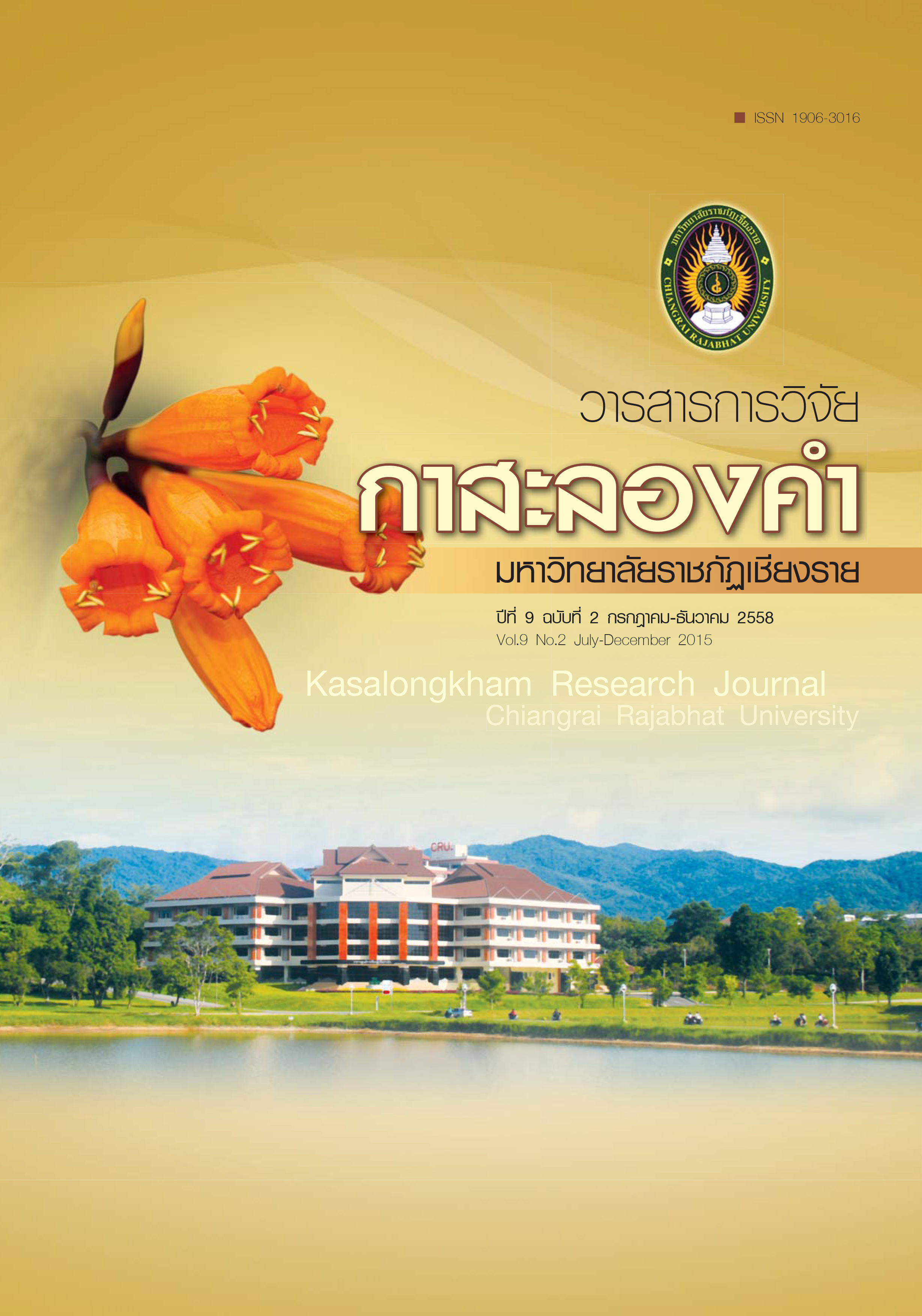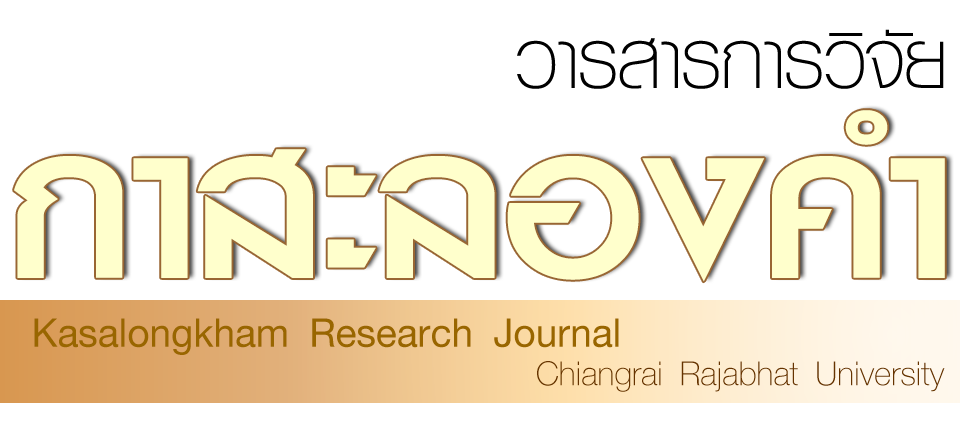ความคิดเห็นของนักศึกษาที่มีต่ออาจารย์คนไทยผู้สอนในหลักสูตรนานาชาติ ในมหาวิทยาลัยแห่งหนึ่งของรัฐ
บทคัดย่อ
งานวิจัยนี้มุ่งศึกษาความคิดเห็นของนักศึกษาที่มีต่ออาจารย์คนไทยผู้สอนในหลักสูตรนานาชาติ ณ มหาวิทยาลัยของรัฐแห่งหนึ่งในประเทศไทย งานวิจัยนี้ใช้วิธีวิจัยทั้งเชิงคุณภาพและเชิงปริมาณ เครื่องมือที่ใช้ในการเก็บข้อมูลประกอบด้วยแบบสัมภาษณ์กลุ่ม (Focus group interview) และแบบสอบถาม (Questionnaire) ในการวิเคราะห์ข้อมูลจากการสัมภาษณ์ใช้หลักทฤษฎี open and axial coding techniques (Strauss and Corbin, 1990) และใช้โปรแกรม SPSS วิเคราะห์ข้อมูลจากแบบสอบถามเพื่อหาค่าสถิติพรรณนา อาทิเช่น ค่าเปอร์เซ็นต์ ประชากรที่เข้าร่วมวิจัยครั้งนี้คือ นักศึกษาชั้นปีที่ 2 จำนวน 32 คน และ นักศึกษาชั้นปีที่ 3 จำนวน 20 คน จากหลักสูตรนานาชาติ
ผลการวิจัยแสดงให้เห็นว่าผู้เข้าร่วมวิจัยส่วนใหญ่ชอบให้อาจารย์ชาวต่างชาติที่เป็นเจ้าของภาษาอังกฤษ(native English speaker teachers) สอนในหลักสูตรนานาชาติมากกว่าอาจารย์คนไทย อย่างไรก็ตาม แม้ผู้เข้าร่วมวิจัยได้คาดหวังว่าหลักสูตรนานาชาติต้องมีอาจารย์ผู้สอนเฉพาะที่เป็นเจ้าของภาษาเท่านั้น แต่นักศึกษาบางส่วนยังต้องการให้มีทั้งอาจารย์คนไทยและอาจารย์ต่างชาติสอนร่วมกันในหลักสูตร เพราะนักศึกษารับรู้ได้ว่าทั้งอาจารย์คนไทยและอาจารย์ชาวต่างชาติเป็นประโยชน์ต่อหลักสูตร ดังนั้นอาจารย์ผู้สอนควรมีบทบาทในการสอนรายวิชาที่ตนเองมีความเชี่ยวชาญตามความรู้และความสามารถทางภาษาอังกฤษของตนเอง
เอกสารอ้างอิง
Avasadanond, B. (2002). The dark side of English language education in Thailand. Retrieved 10 February, 2012, from www.bangkokpost.com/education/site2002/cvoc0802.htm.
Braine, G. (2010). Nonnative speaker English teachers: Research, Pedagogy, and Professional Growth. Routledge.
Braine, G. (2010). NNS English teachers and accents. WATESOL NNEST Caucus Annual Review, 1, 15 – 19.
Chen, X. (2008). A Survey: Chinese college students’ perceptions of non-native English teachers. CELEA Journal, 31(3), 75 – 82.
Cheung, Y. L., & Braine, G. (2007). The attitudes of university students towards non-native speakers English teachers in Hong Kong. RELC Journal, 38(3), 257 – 277.
Grubbs, S. J., Jantarach, V., & Kettem, S. (2010). Studying English with Thai and native-
speaking teachers. Teachers and Teaching: theory and practice, 16(5), 559 – 567.
Lasagabaster, D., & Sierra, J. M. (2002). Research note: University students’ perception of native and non-native speaker teachers of English. Language Awareness, 11(2), 132 – 142.
Ma, L. P. F. (2012). Strengths and weaknesses of NESTs and NNESTs: Perception of
NNESTs in Hong Kong. Linguistics and Education, 23, 1 – 15.
Maum, R. (2002). Nonnative-English-speaking teachers in the English teaching profession.
ERIC Clearing House On Languages and Linguistics, 1 – 2.
Medgyes, P. (1994). The non-native teacher. London: Macmillan.
Medgyes, P. (2001). When the teacher is a non-native speaker. Retrieved 26 May, 2011, from http://teachingpronunciation.pbworks.com/f/When+the+teacher+is+a+non-native+ speaker.PDF
Meadows, B., & Muramatsu, Y. (2007). Native speak or non-native speaker teacher?: A report of
student preferences in four different foreign language classrooms. Arizona Working Papers in SLA &Teaching, 14, 95 – 109.
Ministry of Education (2011). Study in Thailand 2010. Bureau of International Cooperation
Strategy, Office of Higher Education Commission, Thailand.
Phothongsunan, S., & Suwannarak, K. (2008). Native and non-native dichotomy: Distinctive stances of Thai teachers of English. ABAC Journal, 28(2), 10 – 30.
Punthumasen, P. (2007). International program for teacher education: An approach to tackling problems of English education in Thailand. The 11th UNESCO-APEID International Conference Reinventing Higher Education: Toward Participatory and Sustainable Development 12 – 14 December 2007, Bangkok, Thailand. Ret
Reves, T., & Medgyes, P. (1994). The non-native English speaking EFL/ESL teacher’s self- image: An International Survey. System, 22(3), 353 – 367.
Strauss, A., & Corbin, J. (1990). Basics of qualitative research: Grounded theory procedures and techniques. Sage Publications.
Watson Todd, R., &Pojanapunya, P. (2009). Implicit attitudes towards native and non-native speaker teachers.System, 37, 23 – 33.






